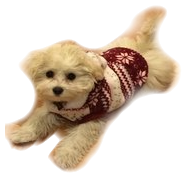 Bringing Loving,Healthy puppies and families together!
Bringing Loving,Healthy puppies and families together!
Helpful Puppy Information
Here at Sherry's Poos we take Great pride in the Health and appearance of our puppies. We want our new puppy owners to know that we have taken every precaution known to us, to assure that your puppy is healthy. We are NOT a veterinarian, but we through we would try to provide you with some helpful information if you see any of these signs in your new puppy so you will know what to do.
Below you will find our schedule that we perform on each and every puppy. Here is what all of our puppies receive in terms of medical attention from birth until they go to their new loving homes.
When the puppies are 3-5 days old dewclaws are removed by our licensed veterinarian.
At 3 weeks of age: we de-worm with Pyrantel Pamoate (Treats roundworms, hookworms and whip-worms)
At 4 weeks of age: we de-worm again with Pyrantel Pamoate (Treats roundworms, hookworms and whip-worms)
At 6 weeks of age: we de-worm with Valbazen for 3 days in a row (Treats roundworms, hookworms, whip-worms and tapeworms).
At 6 weeks of age: Two days before the puppies are 6 weeks old we wean them from their mom and then we take all of our puppies to our vet to get health checked and their first 5 way shot vaccinate which includes (Canine Distemper, Adenovirus Type 2, Parainfluenza, Parvovirus and Coronavirus).
After I worm the puppies for 3 days in a row I use a prevent and/or cure for Coccidian.
What is Coccidian? Coccidian is a protozoa that causes diarrhea in puppies and that occurs usually when they are stressed.
We have seen it every now and then when we wean and when puppies go to their new homes, although with our recent care program, it has become rare here, thankfully!
What Causes the Symptoms? About 60% of all puppies have coccidian parasite in their digestive systems. Many puppies are never physically affected by this protozoa. Stress (such as when a puppy leaves its litter mates and goes to his/her new loving homes) can cause the coccidian to flourish, and this can lead to diarrhea. In extreme cases, the puppy can get severely dehydrated, so it's best to just medicate preventatively in our opinion. We have a strict regimen of prevention while puppies are here.
An Ounce of Prevention is Worth a Pound of Cure: Like most people that raise puppies and that have educated themselves, we treat preventatively for coccidian because it is very hard to avoid having on the property. In fact, I"ve seen references that indicate that ALL kennels have coccidian. It can be carried by bugs (especially flies), rabbits, mice, cats, dogs and other animals. So, when dogs and puppies play in the yard, they can pick up the oocytes. Since we don't believe in keeping puppies in their cages 24 hours a day and 7 days a week (that would not be fun for them OR for us), we know they will be exposed. Yours will too, when you allow him or her to walk on grass in your yard or at parks.
Non-Medicinal Treatments for Diarrhea: If your puppy has liquid/water consistency to stools, and not solid or pudding type stools, it"s time to contact a vet. Liquid stools are a sign of bad diarrhea, and could lead very quickly to dehydration. Dehydration can lead to death. So, totally liquid stools are not to be taken lightly. See or contact a vet.
But for "soft" stools, there "usually" is not a danger to the puppy requiring a vet trip. If you had soft stool, would you go to the doctor? If a puppy has "soft" stools, with a consistency like pudding, as long as the puppy is drinking fluids to prevent dehydration, the concern is much, much less.
Remember, I am not a vet and don't recommend anything. These are just things we"ve tried or heard of. These ideas might not fix the problem if the causes is a protozoa, but they can help control diarrhea in general:
* Plain or vanilla yogurt (with cultures). You can mix with a little cottage cheese.
* Buttermilk (with active cultures).
* Pepto Bismol (2 to 4 times daily for a couple of days, 1 cc to 3 cc"s each time, depending on puppy size.. I have heard 1 tsp per 10 lbs is also a common dosage. Along with this, you can offer Pedialyte or Gatorade ( 1 tablespoon) to help prevent dehydration I use Gatorade.
* Fasting, For early diarrhea signs, you might withhold solid food for a day. For small puppies, do NOT with hold water. In fact, for small puppies, I don"t recommend fasting. But for a 6 month old puppy, it can help to with hold food for a day, and then offer bland food.
* Bland Diet: Rice flavored by boiled chicken for two days. Boil rice with chicken breast for 20 minutes ( 1cup rice, and 2 cups of water and 1 chicken breast). Feed only the rice for two days. On day three, offer some of the chicken breast. If diarrhea goes away, slowly return to regular dog food.
* Canned pumpkin
Health: Hypoglycemia: very young puppies can become hypoglycemic (blood sugar gets too low) if they get too much activity or are not feed often enough. The dog does not know when to stop, so the owner needs to use judgement. Keep play times short intervals. Hypoglycemia is more of a problem in Toys than Miniatures. The smaller the puppy, the more hypoglycemia is a problem. If your puppy is under two pounds, be careful. If your puppy gets very lethargic or appears to have a seizure, call your vet immediately. Ordinary Pedialyte (unflavored) or clear Karo syrup ( a drop on the roof of the month) or Gatorade (1 Tablespoon) can be used to get blood sugar back up. We have found that Nutri-Cal (available at your veterinarian or Pet smart) is excellent to give a puppy an extra boost. Use an eye dropper to get fluids in the puppies mouth.
Young puppies must be fed often, maybe every 2 hours if they are very small. You can watch the puppy eat to make sure he/she gets enough food. Sometimes the puppy will not eat in his/her new environment. You can encourage eating by putting softened food on the tip of your finger and into your puppy mouth. Do not depend on dry food unless the puppy eats it with vigor. Leave the dry food out at all times so the puppy can self regulate food in take. We suggest a supplement of canned food for the first few weeks or if your puppy is eating the dry food good don't mix it with the can food anymore. Mix the puppy can food (about 2 tablespoons) well into the dry food. Don"t just feed your puppy can food always mix it with dry because you don"t want your new puppy to get use to just eating can food he/she needs to eat dry food.
Worms: All puppies can get worms which are passed from the mother dog during nursing. We treat both the puppies and the mother for worms during this period (about every two weeks). You should discuss worming with your vet as the puppies can get reinfected at any time. Small white worms (look likes grains of rice) can be found in some puppies feces. These are tapeworms and come from fleas and can be treated with wormier from your vet. Unless you control the fleas, the tapeworms will re-infest the dog. Dogs can get heart worms which are often lethal to the animal. We do not treat for hearth worms unless the dog is three to four months old. Discuss heart worms with your vet.
It is our hope that we have started your puppy on the road to a very happy and healthy life. We sincerely hope that you and your vet will continue to vaccinate your new family member with yearly boosters. You and/or your vet should continue to treat your new puppy with a heart worm preventative, on a once a month schedule. It is also recommended that all puppies be vaccinated with the rabies vaccine as early as 15 weeks of age, yearly thereafter.
If we can be of any further assistance please feel free to email us at This email address is being protected from spambots. You need JavaScript enabled to view it.or call Amanda at 229-457-4658

NOTE: Our featured puppy Kaia is not for sale. Please do not process a reservation request for her.
You may reserve your Maltipoo Puppy with a $200.00 non-refundable deposit.
Your deposit is applied to the price of your puppy. Sorry, puppies can not be held without a deposit. Remaining balance is due in CASH upon delivery.
229-457-4658 (Cell)